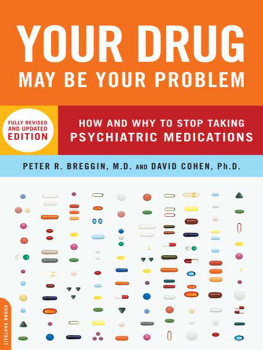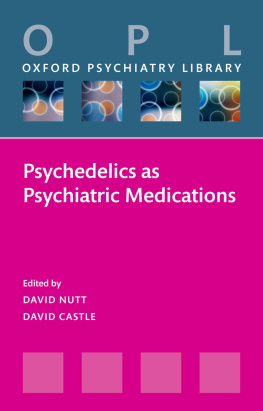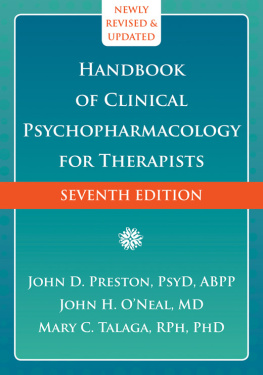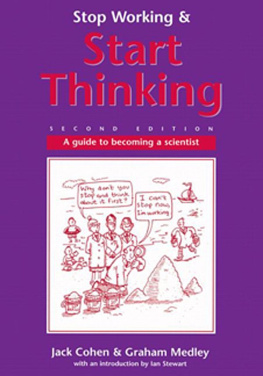Cohen David - Your drug may be your problem: how and why to stop taking psychiatric medications
Here you can read online Cohen David - Your drug may be your problem: how and why to stop taking psychiatric medications full text of the book (entire story) in english for free. Download pdf and epub, get meaning, cover and reviews about this ebook. City: Philadelphia, Penns, year: 2007, publisher: DaCapo Life Long, genre: Religion. Description of the work, (preface) as well as reviews are available. Best literature library LitArk.com created for fans of good reading and offers a wide selection of genres:
Romance novel
Science fiction
Adventure
Detective
Science
History
Home and family
Prose
Art
Politics
Computer
Non-fiction
Religion
Business
Children
Humor
Choose a favorite category and find really read worthwhile books. Enjoy immersion in the world of imagination, feel the emotions of the characters or learn something new for yourself, make an fascinating discovery.
- Book:Your drug may be your problem: how and why to stop taking psychiatric medications
- Author:
- Publisher:DaCapo Life Long
- Genre:
- Year:2007
- City:Philadelphia, Penns
- Rating:3 / 5
- Favourites:Add to favourites
- Your mark:
- 60
- 1
- 2
- 3
- 4
- 5
Your drug may be your problem: how and why to stop taking psychiatric medications: summary, description and annotation
We offer to read an annotation, description, summary or preface (depends on what the author of the book "Your drug may be your problem: how and why to stop taking psychiatric medications" wrote himself). If you haven't found the necessary information about the book — write in the comments, we will try to find it.
Cohen David: author's other books
Who wrote Your drug may be your problem: how and why to stop taking psychiatric medications? Find out the surname, the name of the author of the book and a list of all author's works by series.
Your drug may be your problem: how and why to stop taking psychiatric medications — read online for free the complete book (whole text) full work
Below is the text of the book, divided by pages. System saving the place of the last page read, allows you to conveniently read the book "Your drug may be your problem: how and why to stop taking psychiatric medications" online for free, without having to search again every time where you left off. Put a bookmark, and you can go to the page where you finished reading at any time.
Font size:
Interval:
Bookmark:
Advance Praise for
Your Drug May Be Your Problem
In non-technical, easy to understand language, Peter Breggin and David Cohen bring an incredibly important and hardly ever recognized message to people who need to understand the dark side of psychiatric drugs and how to stop taking them. I heartily recommend it.
Candace Pert, Ph.D.
Research Professor of Physiology and Biophysics
Georgetown University Medical Center
Author of Molecules of the Mind
Washington, D.C.
Confronting current psychiatric drug prescribing practice head-on is a daunting taskwe owe Breggin and Cohen a vote of thanks for openly speaking the truth. Despite what the pharmaceutical companies would have us believe, we dont need a better life through chemistry. This book will help debunk this myth and provide practical advice on how to avoid psychiatric drugs and get off them.
Loren Mosher, M.D.
Soteria Associates, Former Chief of the Center for
Studies of Schizophrenia, National Institute of Mental Health
San Diego, California
This book is long overdue. Drs. Breggin and Cohen make possible the practice of psychiatry with a conscience.
Bertram P. Karon, Ph.D.
Professor of Clinical Psychology
Michigan State University
East Lansing, Michigan
The modern medical approach to almost any human problem is to find a druga sort of magic bulletto fix it. But many drugs do more harm than good, and some even cause the problems they are supposed to fix. And once on a drug, coming off may also be dangerous. In this clear and important book, Peter Breggin and David Cohen outline the problems and provide a step-by-step account of how to come off the drug which may be harming you.
Steven Rose, Ph.D.
Professor of Biology and Director, Brain and
Behaviour Research Group, Open University
Milton Keynes, England
This is a courageous, compassionate book, and a much needed antidote to the pro-drug bias of modern psychiatry and psychology.
John Horgan
Author of The End of Science
and The Undiscovered Mind
Garrison, New York
Your Drug May Be Your Problem is a clear, accurate, and thorough look at the dangers of psychiatric drugs, and a prudent outline of what steps to take for those who want to stop taking them.
Thomas J. Moore
Author of Prescription for Disaster:
The Hidden Dangers in Your Medicine Cabinet
Washington, D.C.
I wish I had this book when I was trying to come off psychiatric drugs. How wonderful that you have provided this guide.
Kate Millett
Author of Sexual Politics
and The Loony Bin Trip
New York, New York
Working as a consultant, I am constantly looking for ways to help clients achieve a more educated view regarding psychotropic medication. Breggin and Cohen have assembled a gold mine of information to assist in this process. I can think of no other book that has done such a superb job of making such information accessible at any point of decision regarding taking or discontinuing psychotropic medication.
Tony Stanton, M.D.
Psychiatric Consultant
Bremerton, Washington
This book is one of the most important things that has happened to psychiatry and especially to so-called psychiatric patients during this century. Having worked for more than 20 years with so-called schizophrenicsthe main victims of the abuse by prescribed psychiatric drugs I can say that Peter Breggin and David Cohen must be praised for the courage they have had to unmask many pseudo-scientific conclusions frequently present in supposedly scientific literature.
Alberto Fergusson, M.D.
Psychiatrist, Psychoanalyst, and Institute Director
Bogota, Colombia
Many patients initially experience weight loss when taking SSRIs. While some people may welcome this effect, it can be harmful to those already suffering from lack of appetite and excessive weight loss. Furthermore, over a period of months this drug effect tends to reverse, and many people experience weight gain leading to obesity.
The blunting effects of SSRIs on libido and sexual functioning are now well established. In large surveys of thousands of patients in the United States and abroad, rates of SSRI-induced induced sexual dysfunctions reach upwards of 40 percent, Yet, the authors of one such survey concluded that Physicians consistently underestimated the prevalence of antidepressant-associated sexual dysfunction.29 Recently, reports of sexual adverse effectstotal libido loss, loss of genital sensitivity, and genital anesthesiapersisting months and years after cessation of SSRIs have begun to surface, leading some to suggest that these drugs may be permanently altering gene expression.30
This category comprises imipramine (Tofranil, Imavate, Presamine, SK-Pramine, Janimine), desipramine (Pertofrane, Norpramin), amitriptyline (Elavil), nortriptyline (Aventyl, Pamelor), protriptyline (Vivactil), doxepin (Sinequan, Adapin), trimipramine (Surmontil), and Anafranil (clomipramine).
Probably all antidepressants are capable of causing seizures and manic psychoses. Even relatively small doses can result in dulled and flattened feelings or agitated and wired feelings. Most tricyclic antidepressants have a variety of anticholinergic effects including blurred vision, dry mouth, constipation, difficulty urinating, and cardiac arrhythmias that sometimes prove fatal, especially among adults with heart problems and among children and the elderly. They frequently cause serious withdrawal reactions (see ).
This category comprises Asendin (amoxapine), Desyrel (trazodone), Effexor (venlafaxine), Ludiomil (maprotiline), Remeron, Remeron Sol Tab, Remeron RD, Cymbalta (duloxetine), and Wellbutrin, Wellbutrin SR, Wellbutrin XL or Zyban (buproprion). See for a complete
Your Drug May Be Your Problem provides much useful and very practical information, and it is much needed considering that there is such massive propaganda by the pharmaceutical and medical industries about such drugs. This propaganda must be combated, and this book contributes to that effort.
Wolf Wolfensberger, Ph.D.
Research Professor of Education
Syracuse University
Director, Training Institute for Human Service Planning,
Leadership and Change Agentry
Syracuse, New York
Your Drug May Be Your Problem is an honest and straightforward attempt to present a clear picture of drug effects, why we turn to drugs, their role in society, and more. It fills a real need in our current drug culture and in our current complete trust in the drug dispenser himself. The books main import will be to serve as a counter-balance to the myth of a miracle drug cure. Its a must on everyones bookshelf!
Rhoda L. Fisher, Ph.D.
Clinical Psychologist
Syracuse, New York
I recommend Your Drug May Be Your Problem as the number one self-help guide to coming off psychiatric drugs.
Steven Baldwin, Ph.D.
Senior Editor, Ethical Human Sciences and Services
Foundation Professor of Psychology
School of Social Sciences, University of Teesside, Teesside, UK
Anyone considering saying yes to psychiatric drugs, or wanting to just say no, should first say YES to buying and reading this essential, informative book. Breggin and Cohens goal is empowerment of troubled people seeking help, not propaganda, pressure, or profit. This book questions, informs, warns, and leaves the reader far better able to choose wisely.
Next pageFont size:
Interval:
Bookmark:
Similar books «Your drug may be your problem: how and why to stop taking psychiatric medications»
Look at similar books to Your drug may be your problem: how and why to stop taking psychiatric medications. We have selected literature similar in name and meaning in the hope of providing readers with more options to find new, interesting, not yet read works.
Discussion, reviews of the book Your drug may be your problem: how and why to stop taking psychiatric medications and just readers' own opinions. Leave your comments, write what you think about the work, its meaning or the main characters. Specify what exactly you liked and what you didn't like, and why you think so.








